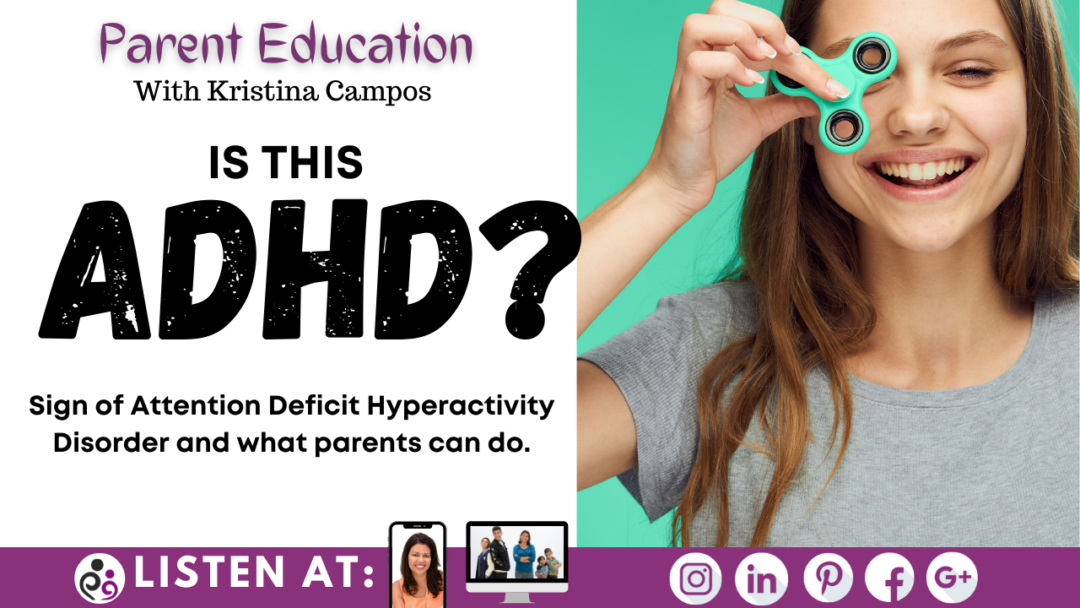Is This ADHD? Understanding the signs of Attention Deficit Hyperactivity Disorder. Kristina Campos, the founder of The Impactful Parent, talks to parents about Attention Deficit Hyperactivity Disorder, signs, and what parents can do to help their children.
Click on the link below to listen to the podcast! 👇
LINKS MENTIONED IN THE RECORDING
https://theimpactfulparent.com/app Download the FREE Impactful Parent App! Available on Apple and Android App Stores. FREEBIES from episodes included!
Apple Store: https://theimpactfulparent.com/ios
Android Play Store: https://theimpactfulparent.com/android
https://theimpactfulparent.com for more FREE Resources and paid programs.
Rate, Review, & Subscribe!

“I love Kristina and all the FREE tips that she has to offer! Thank you for making my parenting journey better!” <– If that sounds like you, please consider rating and reviewing my show! This helps me support more people — just like you!!!
Rate with five stars, and select “Write a Review.” Then be sure to let me know what you loved most about the episode!
Also, if you haven’t done so already, subscribe to the podcast. I’m adding a bunch of bonus episodes to the feed and, if you’re not subscribed, there’s a good chance you’ll miss out. Subscribe now!
What to do next:
1. Get The Impactful Parent App! Everything you need in your parenting journey in one spot! Available on the Android Play Store and the Apple Store. Search Impactful Parent (direct links listed above under Links in Episode).
2. Follow The Impactful Parent on social media if you don’t already! Facebook, Instagram, LinkedIn, & Pinterest
4. Check out the official website of The Impactful Parent for FREE RESOURCES, parenting classes, mom’s groups, and so much more! Click here to check it out!
5. Discover how you can work with Kristina! Sign up for a FREE 30-minute discovery call! Click here to find a time that works best for you!
Bottom Line… I am here for YOU! Contact me at theimpactfulparent@gmail.com

TRANSCRIPT
Is This ADHD?
Understanding ADHD and its signs
Welcome Impactful Parents. Today we are going to talk about ADHD in your school-aged child.
Hello, my name is Kristina Campos. I am the founder of the Impactful Parent. Every week I come on and answer one of your questions LIVE. If you have a question for next week, please submit it at theimpactfulparent@gmail.com or by messaging me on social media. All submissions are kept anonymous.
Today, an audience member wrote in and said they think their child might have ADHD, but they don’t know for sure. This parent asked, what are the signs of ADHD, and how can I tell if I need to get my child diagnosed.
Thank you for submitting this question! Today I will tell you signs of ADHD and stick around to the end because I am giving you —- tips for helping your child with ADHD so you can be a more impactful parent. Let’s get started!
Attention Deficit Hyperactivity Disorder or ADHD looks like hyperactive and impulsive behaviors in children. There are many symptoms of ADHD, including high activity levels, difficulty remaining still, and a limited attention span.

Is This ADHD?
There are 3 types of ADHD. Keep in mind it looks a little different in every person. Some children have inattentive and distractible behaviors without having hyperactivity. Some children have impulsive and hyperactive behaviors without inattention or trouble being distracted. And yet some other children have a combination of both.
If you think your child might have Attention Deficit Hyperactivity Disorder, consider that their ADHD has to be present in more than one area of life and in more than one setting to be diagnosed with ADHD. For example, their inattention and hyperactivity must be seen while doing homework and when trying to complete chores at home. The ADHD must also be noticeable at home and at school. Lastly, doctors will also be looking at whether these behaviors have lasted more than 6 months.
What does Attention Deficit Hyperactivity Disorder look like?
Let’s start with signs of distract-abilities and inattention.
Your child may exhibit:
- No attention to detail and make careless mistakes
- Trouble holding attention
- Doesn’t seem to listen
- Does not follow through with instructions or has trouble finishing schoolwork, chores, and duties
- Gets sidetracked
- Trouble with organization
- Avoids tasks that require mental effort for long periods
- Loses things they need
- Easily distracted
- Seems forgetful
Then there are also signs of hyperactivity that parents can look for. These signs might look like this:
- Your child fidgets, squirms, and can’t seem to keep still
- Leaves seat often and walks around when others can remain seated
- Climbs
- Restlessness
- Unable to take part in leisure activities
- Your child feels “On the go.”
- Talks excessively
- Blurts out their thoughts without thinking first and doesn’t seem to have a verbal filter
- Trouble waiting their turn
- Interrupts and intrudes
Attention Deficit Hyperactivity Disorder can cause many problems in children’s lives. This is why parents need to understand their child’s brains and help them control their behaviors if necessary. One of the most common problematic issues that arise with ADHD is impulsivity. Depending on your child, parents need to gauge if impulsive behaviors can lead to more trouble, like when a child can’t stop themselves from running into the street to get a ball or when they can’t control how they react when someone speaks harshly to them. Impulsive behaviors have the potential to lead to more problems.
Other troubling side effects of ADHD in many children are anxiety, learning disabilities, trouble in school, trouble handling finances, and even trouble in the workplace depending on their job. Some people with mild systems may feel like none of these side effects are detrimental and opt to control their ADHD internally. Other families will seek a doctor’s assistance in managing the ADHD symptoms. Side effects aren’t harmful to the child’s goals and lifestyle.

Is This ADHD?
Treatment for Attention Deficit Hyperactivity Disorder?
Treatment for Attention Deficit Hyperactivity Disorder can come in the form of medication. This is a very popular way to handle the side effects of ADHD; however, it is not the only form of treatment. Behavior therapy, psychotherapy, and social skills training are other forms of treating ADHD and good options to look into with a mental health professional if you don’t want to use medication with your child.
What can parents do to help their child with ADHD?
Suppose you want to be a more impactful parent. In that case, there are also some things you can do at home to help your child with Attention Deficit Hyperactivity Disorder.
Parents can help their child with ADHD #1: Create a routine. Routine creates stability, predictability, and security for children. Children with ADHD accomplish more with routine. Whether you are making a morning or bedtime routine, a routine for homework completion, or a routine for household chores- your ADHD child will be more successful with a routine in place. Create consistency with what they need to do, when they need to work on their to-do list, and how tasks should be accomplished.
Parents can help their child with ADHD #2: Use sticky notes. Anytime your child may need a little extra reminder that they have to complete a task, use a sticky note to help them. You can put sticky notes in their backpacks, lunch boxes, on the steering wheel of their car, on the bathroom mirror, anywhere! Be creative!
Parents can help their child with ADHD #3: Encourage your child to use a daily planner. From an early age, teach your child to write down their responsibilities and to-do lists. Younger children can draw a picture of their to-do item, and older children can use the calendar on their smartphones. Whatever type of planner or calendar you want to use, parents can help their ADHD child understand their responsibilities better if they teach their children how to make lists.
Parents can help their child with ADHD #4: Have a place for everything. This technique helps children not lose their things, misplace an item, or forget where they were. Purchase bins, tubs, shoe boxes, etc., and label those containers. This type of organization can be extremely helpful and save a lot of time looking for lost items.
Parents can help their child with ADHD #5: Help them get longer tasks done, like homework, by giving frequent movement breaks and breaking large tasks into smaller chunks. Your child will need the movement breaks to concentrate better. I suggest buying a visual timer and setting movement breaks every 20 minutes. Movement breaks should last about 5 minutes. Finally, help your child refocus and get back on task. This might look like helping them sit down and read the next homework question aloud to them or helping complete the next math problem. Either way, helping your child refocus is more effective than just telling your child they need to get back on track. You may also want to help your child break up their tasks into smaller, more manageable chunks so that their responsibilities don’t feel overwhelming. Kids often need help with this. Don’t assume that your child can automatically break down an activity into smaller pieces. They may need your assistance with this also until they master the skill.

Is This ADHD?
Parents can help their child with ADHD #6: Make sure your child lives a healthy lifestyle. This means encouraging your child to eat well and sleep at least 8 hours at night. You also want to encourage plenty of exercises and physical activity.
Parents can help their child with ADHD #7: Limit distractions when you want your child to focus. This means turning off the background noise, the tv, the music and limiting the people in the room. The least amount of distractions possible will be beneficial.
Parents can help their child with ADHD #8: Praise your child often for their efforts. Kids with Attention Deficit Hyperactivity Disorder are often told “No” and “stop that” often. Instead, focus your attention on when your child is doing well so you can bring up their self-esteem. Give your child lots of affection and words of affirmation.
Parents can help their child with ADHD #9: Use a visual timer to help with transitions. Some kids with ADHD can’t identify time. 5 minutes and 15 minutes feel the same to them. To help kids transition from one activity to another, I suggest buying a visual timer and warning children about how long they have to complete a task. Let the visual timer show them how much time is left to start learning how to anticipate time management.
What can parents do to help their child with ADHD #10: Encourage out loud thinking. Anytime you can help your child think things through or problem solve, you will set them up for further success. Encourage your child to think aloud so you can hear their thought processes and help them navigate their thoughts and intentions.
And if you have a question you want to submit for me to answer live, please do! Submit your questions by DM or email at theimpactfulparent@gmail.com. Plus- if you want to become a more Impactful Parent, check out all that my website has to offer! I have parenting courses, family coaching, a free parenting app, and many free resources. But until next time, you got this, parents. I am just here to help
It takes a lot to run a family! Here are a few products I recommend.
Gabb Wireless: The BEST first phone for your child!
- No internet, no social media, and NO WORRIES! This phone has GPS tracking and other features that parents want to have peace of mind about their child having a phone. The Gabb Wireless phone has the sleek look of a smartphone that kids love without worry and high price. To find out more and order your phone (or watch) go to: gabbwireless.com/promo/IMPACTFULPARENT30

